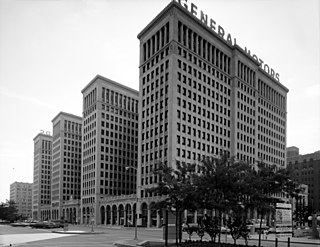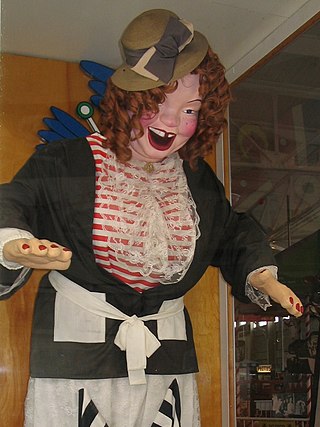
The Upper Peninsulaof Michigan—also known as Upper Michigan or colloquially the U.P. or Yoop—is the northern and more elevated of the two major landmasses that make up the U.S. state of Michigan; it is separated from the Lower Peninsula by the Straits of Mackinac. It is bounded primarily by Lake Superior to the north, separated from the Canadian province of Ontario at the east end by the St. Marys River, and flanked by Lake Huron and Lake Michigan along much of its south. Although the peninsula extends as a geographic feature into the state of Wisconsin, the state boundary follows the Montreal and Menominee rivers and a line connecting them.

Interstate 96 (I-96) is an east–west Interstate Highway that runs for approximately 192 miles (309 km) entirely within the Lower Peninsula of the US state of Michigan. The western terminus is at an interchange with US Highway 31 (US 31) and Business US 31 on the eastern boundary of Norton Shores southeast of Muskegon, and the eastern terminus is at I-75 near the Ambassador Bridge in Detroit. From Grand Rapids through Lansing to Detroit, the freeway parallels Grand River Avenue, never straying more than a few miles from the decommissioned US 16. The Wayne County section of I-96 is named the Jeffries Freeway from its eastern terminus to the junction with I-275 and M-14. Though maps still refer to the freeway as the Jeffries, the portion within the city of Detroit was renamed by the state legislature as the Rosa Parks Memorial Highway in December 2005 in honor of the late civil rights pioneer. There are four auxiliary Interstates as well as two current and four former business routes associated with I-96.

Frankenmuth is a city in Saginaw County in the U.S. state of Michigan. The population was 4,987 at the 2020 census. The city is surrounded by Frankenmuth Township.

Pole Position is a racing arcade video game released by Namco in 1982. It was licensed to Atari, Inc. for US manufacture and distribution. Pole Position is considered one of the most important titles from the golden age of arcade video games. It was an evolution of Namco's earlier arcade racing electro-mechanical games, notably F-1 (1976), whose designer Sho Osugi worked on Pole Position.

The Nintendo VS. System is an arcade system that was developed and produced by Nintendo. It is based on most of the same hardware as the Family Computer (Famicom), later released as the Nintendo Entertainment System (NES). As Nintendo was planning to release the NES in North America, they were aware of the video game crash of 1983 and its effects on the home console market. By March 1984 the arcade industry recovered enough for a plan to introduce NES titles there, with the VS. System later being a presentation to players who did not yet own the console. It became the first version of the Famicom hardware to debut in North America.

Mortal Kombat 3 is a 1995 fighting game developed and published by Midway Games for arcades. It is the third main installment in the Mortal Kombat franchise and a sequel to 1993's Mortal Kombat II. As in the previous games, it has a cast of characters that players choose from and guide through a series of battles against other opponents. The game avoids the tournament storyline of its predecessors, as various warriors instead fight against the returning Shao Kahn, who has resurrected his bride Sindel and started an invasion of Earthrealm.

Toontown Online, commonly known as Toontown, was a 2003 massively multiplayer online role-playing game (MMORPG) based on a cartoon animal world, developed by Disney's Virtual Reality Studio and Schell Games, and published by The Walt Disney Company.
1988 saw many sequels and prequels in video games, such as Dragon Quest III, Super Contra, Super Mario Bros. 2, Mega Man 2, Double Dragon II: The Revenge, and Super Mario Bros. 3, along with new titles such as Assault, Altered Beast, Capcom Bowling, Ninja Gaiden, RoboCop, Winning Run and Chase H.Q.
1982 was the peak year for the golden age of arcade video games as well as the second generation of video game consoles. Many games were released that would spawn franchises, or at least sequels, including Dig Dug, Pole Position, Mr. Do!, Zaxxon, Q*bert, Time Pilot and Pitfall! The year's highest-grossing video game was Namco's arcade game Pac-Man, for the third year in a row, while the year's best-selling home system was the Atari 2600. Additional video game consoles added to a crowded market, notably the ColecoVision and Atari 5200. Troubles at Atari late in the year triggered the video game crash of 1983.
1978 saw the release of new video games such as Space Invaders. The year is considered the beginning of the golden age of arcade video games. The year's highest-grossing video game was Taito's arcade game Space Invaders, while the best-selling home system was the Atari Video Computer System.

Hang-On is an arcade racing game released by Sega in 1985 and later ported to the Master System. In the game, the player controls a motorcycle against time and other computer-controlled bikes. It was one of the first arcade games to use 16-bit graphics and uses the Super Scaler arcade system board, created with design input from Yu Suzuki, as technology to simulate 3D effects. The deluxe cabinet version also introduced a motion-controlled arcade cabinet, where the player's body movement on a large motorbike-shaped cabinet corresponds with the player character's movements on screen.

Cadillac Place, formerly the General Motors Building, is a landmark high-rise office complex located at 3044 West Grand Boulevard, in the New Center area alongside the Detroit River, of downtown Detroit, Michigan, in the Great Lakes region of the Midwestern United States.

Interstate 375 (I-375) is a north–south auxiliary Interstate Highway in Detroit, Michigan, United States. It is the southernmost leg of the Walter P. Chrysler Freeway and a spur of I-75 into Downtown Detroit, ending at the unsigned Business Spur I-375, better known as Jefferson Avenue. The freeway opened on June 12, 1964. At only 1.062 miles (1.709 km) in length, it once had the distinction of being the shortest signed Interstate Highway in the country before I-110 in El Paso, Texas, was signed. The Michigan Department of Transportation (MDOT) announced in 2021 plans to convert the freeway to a boulevard. Details of that project were revealed in April 2023 with MDOT reaffirming that construction is scheduled to begin in 2025.

The Musée Mécanique is a for-profit interactive museum of 20th-century penny arcade games and artifacts, located at Fisherman's Wharf in San Francisco, California. With over 300 mechanical machines, it is one of the world's largest privately owned collections.

Laffing Sal is one of several animatronic characters that were built primarily to attract carnival and amusement park patrons to funhouses and dark rides throughout the United States. Its movements were accompanied by a raucous laugh that sometimes frightened small children and annoyed adults.

FanDuel Sports Network Detroit is an American regional sports network owned by Main Street Sports Group and operated as an affiliate of FanDuel Sports Network. It provides coverage of local sports teams in the state of Michigan, primarily focusing on those in Metro Detroit. The network airs exclusive broadcasts of games involving the Detroit Tigers, Detroit Pistons, and Detroit Red Wings; repeats of Detroit Lions preseason games; and some high school sports.
Marvin's Marvelous Mechanical Museum is an arcade and museum currently located in Farmington Hills, Michigan. It features a large collection of vintage arcade games and other coin-operated entertainment machines, most of which are functional and can be operated by visitors. Exhibits include, for example, the gypsy Fortune teller machine that used to feature in many carnival sideshows.

Head On is an arcade video game developed by Sega/Gremlin and released by Sega in 1979. It was the first maze video game where the goal is to run over dots. Designed by Lane Hauck at Sega/Gremlin in the United States, it was the fourth highest-grossing arcade game of 1979 in both Japan and the US.

The cuisine of Michigan is part of the broader regional cuisine of the Midwestern United States. It is reflective of the diverse food history of settlement and immigration in the state, and draws its culinary roots most significantly from the cuisines of Central, Northern and Eastern Europe, and Native North America.

Capcom Arcade Stadium is a 2021 video game compilation developed and published by Capcom. It includes 32 arcade games originally published by Capcom between 1984 and 2001; the game itself is free to download with a single free game, while the others require individual purchases. The compilation was initially released on Nintendo Switch, then on PlayStation 4, Windows, and Xbox One, and later Amazon Luna. A second compilation, Capcom Arcade 2nd Stadium, was released in 2022.















